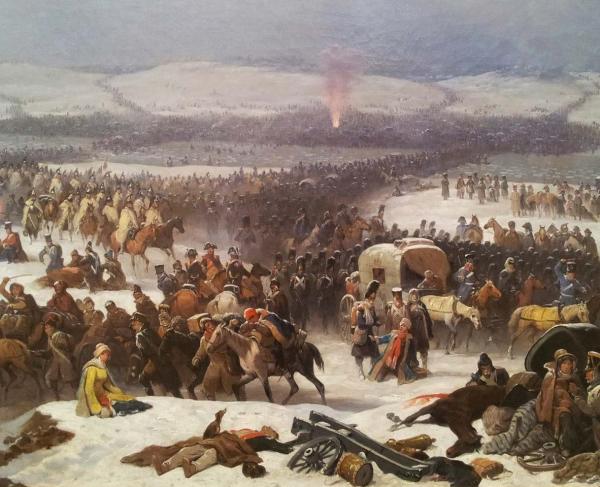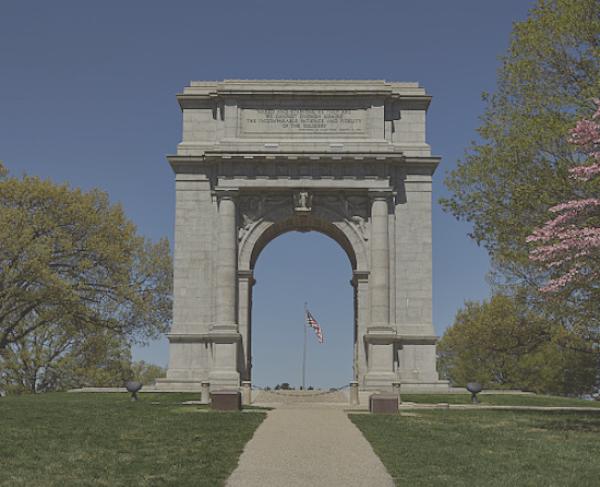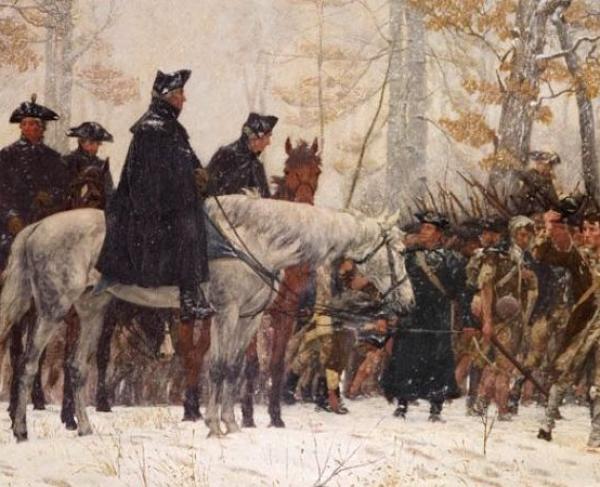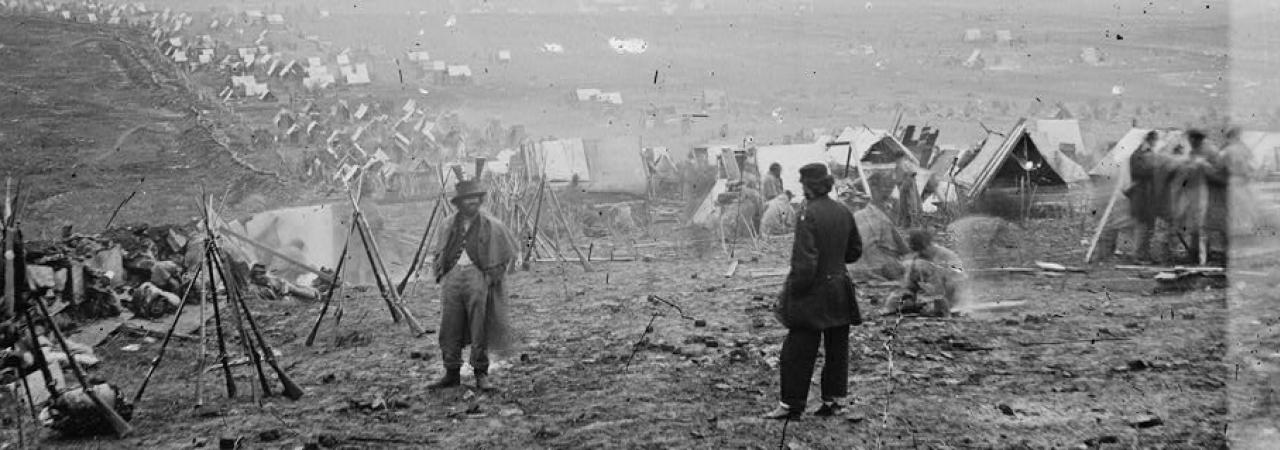
Union soldiers outside Nashville, TN, during the winter of 1864.
Civil War winters were particularly trying and monotonous for the armies. Impassable, muddy roads and harsh weather precluded active operations. Disease ran rampant, killing more men than battles. But with all of its hardships winter also allowed soldiers an opportunity to bond, have a bit of fun, and enjoy their more permanent camps. Through these bleak months all soldiers, Union and Confederate, had to keep warm and busy in order to survive.

"The view is wild, bleak, and desolate. The elements, which have been warring for the last fortnight, have called a truce and left a sea of mud."
– George P. McClellan 155th Pennsylvania Infantry
While on the move in warmer weather, soldiers often slept in, easily-erected canvas tents or they simply slept without cover, under the stars. In the winter, large camps were established with more substantial shelter. Winter huts were built by the armies out of the surrounding materials including: trees, mud, leaves, and soldiers’ canvases. These huts usually included a chimney, which kept the small space warm, but some were more effectively built than others.
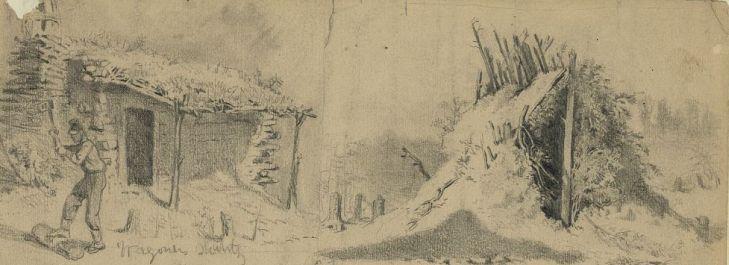
"We then rake up dry leaves and fill the dog house about ten inches deep with the leaves, which makes us a good warm bed."
-Private John W. Stevens, 5th Texas Infantry

"Thursday Dec. 17th – Last night was very stormy – this morning no better. Our house leaks all over, and our chimney works badly, which make things rather uncomfortable."
– Lieutenant Charles Stewart 124th New York Volunteers
The camps were set-up much like small villages complete with crisscrossing lanes called "company streets", churches, and sutlers’ shops. While this may seem cozy, these temporary villages lacked the appropriate systems to provide clean water and clear away waste; additionally, food was scarce. Disease and death abounded and spread easily.

“…within a few hours of Washington, men are dying of scurvy because they haven’t transportation enough to give us potatoes & onions. Some of my men are in a horrible state. They can press their thumb into their legs & leave the dent there exactly as if they were putty.”
– Captain Henry Livermore Abbott, 20th Massachusetts Volunteer Infantry, January 3, 1863
Video: Civil War Medicine In4 » | Civil War Medicine »
However bad the weather, boredom was an ever-present problem. Commanders and soldiers alike tried to establish regular activity and work to break the monotony. Drilling, camp up-keep, religious services, letter writing, card games, storytelling, and even the occasional snow ball fight were all part of camp life.

“Dec. 20/64 – The weather is cold, but we keep up our drills believing it is to be better for the men.”
– Elisha Hunt Rhodes, 2nd Rhode Island Volunteers
Video: Soldier Life In4 » | Life of the Civil War Soldier in Camp » | Life at War lesson plan »
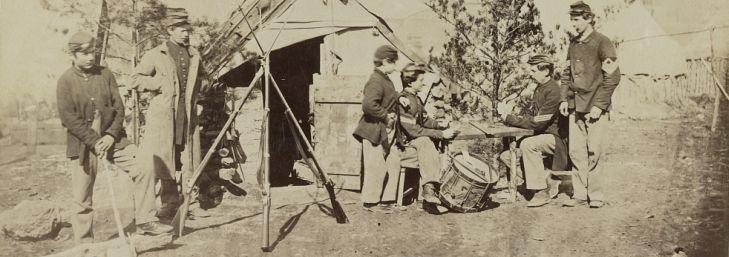
"There is a string band in the regiment, and occasionally they have a serenade around the different companies and call out the Colonel and captains to make them a speech, which is generally responded to."
- Sergeant Henry G. Orr, 12th Texas Cavalry, December 21, 1861
Learn more about the music of the 1860s »

"The usual routine of army life was carried on day by day, with not many incidents to vary the monotony of camp life. But occasionally the soldiers would engage in a snow ball battle, in which generals, colonels, captains and privates all took part."
- Sam Watkins, Co. H., First Tennessee Regiment, Winter of 1864
An account from the winter quarters at Dalton, GA »
Despite the best efforts of their officers, or lack thereof, many soldiers strayed to less desirable activities.

"It is a bad thing for an army to remain too long at one place. The men soon become discontented and unhappy, and we had no diversion or pastime except playing poker and chuck-a-luck."
- Sam Watkins, Co. H., First Tennessee Regiment, January, 1863

“Christmas caught up with us again and came on in full sympathy of the times, boisterous and stormy. It seemed there were more fighting and drinking in camp than usual, gambling was again on the rampage.”
– Dr. W. J. Worsham 19th Tennessee, December, 1863
Discover what Christmas was like during the Civil War »
As the war progressed winter encampments displayed the resources available to each army. The Confederacy began to run low on supplies and food, and their camps suffered while Union might, supplies, and transportation facilitated more comfortable winter for its soldiers.
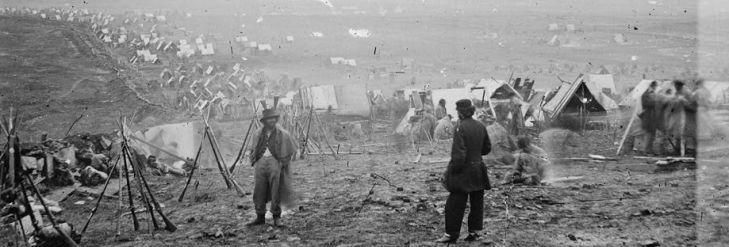
"We bivouac on the cold and hard-frozen ground, and when we walk about, the echo of our footsteps sound like the echo of a tombstone. The earth is crusted with snow, and the wind from the northwest is piercing our bones. We can see our ragged soldiers, with the sunken cheeks and famine-glistened eyes."
- Sam Watkins, Co. H., First Tennessee Regiment, December, 1864
When the spring arrived, soldiers gathered their belongings including their canvasses and marched away. However, remnants of the camp remained and in some cases, soldiers saw their old camp again.

"When we arrived at Dalton, we had a desire to see how the old place looked; not that we cared anything about it, but we just wanted to take a last farewell look at the old place."
- Sam Watkins, Co. H., First Tennessee Regiment
